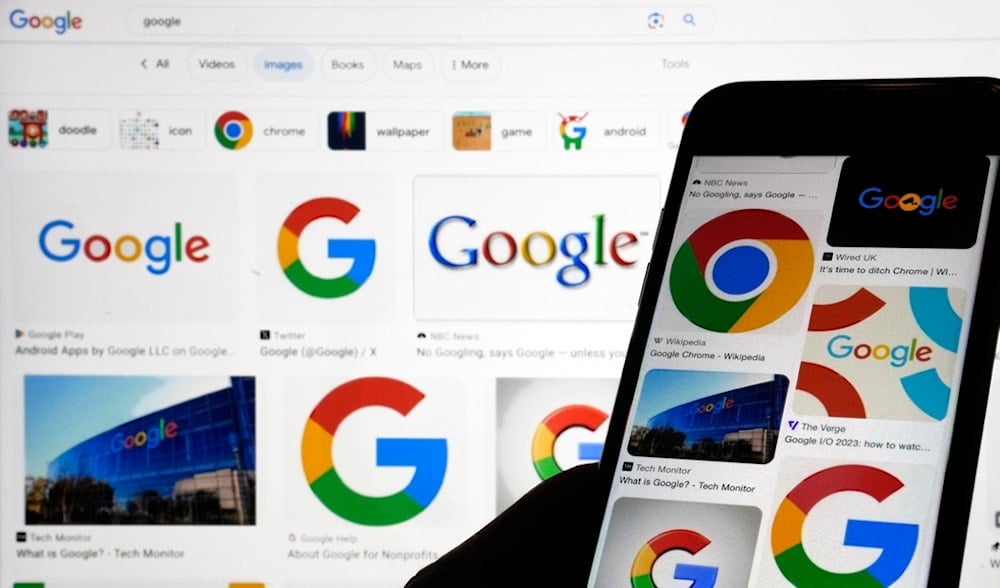Google defends Chrome browser amid calls for antitrust remedies
Google urges a US judge to reject calls to spin off its Chrome browser, defending its market practices as legal amid a major antitrust case and rising AI competition in online search.
-

Google logos are displayed when searched for Google in New York, Sept. 11, 2023 (AP)
Google has asked a US federal judge to dismiss proposals that it spin off its Chrome browser, arguing such a move is unnecessary and unfounded. This plea comes as the tech giant faces potential penalties after a landmark ruling found it illegally maintained a monopoly in the online search market.
The final arguments were delivered Friday in Washington, D.C., before US District Court Judge Amit Mehta, who is considering what remedies to impose. Government lawyers are calling for Google to divest its Chrome browser and limit its ability to secure default search engine agreements with companies like Apple and Samsung.
Government pushes back against Google’s dominance
US Department of Justice attorney David Dahlquist argued that Chrome plays a critical role in maintaining Google’s search dominance. He pointed to deals with Apple, which received billions of dollars from Google to make its tools default on iPhones. Dahlquist also claimed Apple had asked for more flexibility in its browser options but was repeatedly denied.
The government contends that such exclusive agreements, combined with Google’s control of Chrome and Android, are anti-competitive and hinder user choice, particularly as artificial intelligence becomes increasingly integral to search.
Google argues against breaking up Chrome
Google attorney John Schmidtlein countered that there was no evidence suggesting that users would have switched to other search engines like Microsoft Bing even if those exclusivity contracts were not in place. He cited Verizon’s decision to install Chrome on devices despite owning Yahoo! search engine as an example of market-driven behavior.
"Of around 100 witnesses heard during trial, none stated that more flexibility would have resulted in choosing Bing," Schmidtlein said.
Google also argued that the Justice Department has extended beyond the original scope of the case by pushing for a Chrome spinoff and suggesting the possible sale of Android, its mobile operating system.
Read more: Google monopolized market via billions spent on default search: DoJ
More on monopoly: Google faces £5bln UK lawsuit
At the same time, Google is under legal fire in the United Kingdom, facing a massive £5 billion ($6.6 billion) class-action lawsuit over claims that it used its dominant position in online search to suppress competition and extract inflated profits from advertisers.
The case, filed at the UK Competition Appeal Tribunal, is being led by legal expert Or Brook and backed by the law firm Geradin Partners. It represents an estimated 250,000 UK-based businesses that have relied on Google's search advertising services since 2011.
According to the claim, Google's dominance has been systematically reinforced through a series of anti-competitive practices. The US company is accused of marginalizing rival search engines and turning its platform into the de facto advertising space by creating artificial barriers to entry and choice. As CNBC reported, Google "made deals with smartphone makers to pre-install Google Search and the Chrome browser on Android devices, and paid Apple billions of dollars to make Google the default search engine in the Safari browser."
AI emerges as new battleground
The proceedings unfold as generative AI tools like ChatGPT, Perplexity, and Microsoft’s AI-enhanced search increasingly challenge Google’s dominance. The original antitrust case against Google was filed five years ago, before the AI boom, but now AI capabilities are a key point of contention.
Google has been integrating AI into its search and broader tech ecosystem to retain its leadership in the rapidly evolving space.
This also includes the use of AI to collaborate with the Israeli military. Leaked documents have unveiled Microsoft's growing involvement with "Israel's" military operations, highlighting the tech giant's significant contributions to the Israeli occupation forces (IOF) during its 2023 war on Gaza.
The materials reveal an intensification of collaboration between Microsoft and the IOF, particularly in the areas of cloud computing and artificial intelligence, as the military's demand for advanced technology soared during the war.
What comes next?
Judge Mehta has yet to issue a decision on remedies. His ruling could reshape the future of search, browser distribution, and competitive dynamics in the age of AI.
The case continues to be one of the most closely watched antitrust challenges in the tech industry, with potential implications for how major platforms operate across the digital economy.

 4 Min Read
4 Min Read










